WHO IS ALFRED HITCHCOCK?
Alfred Hitchcock earned his title as the Master of Suspense and it is one that he certainly deserves. Unlike other directors who worked in multiple genres, Hitchcock remained true to his preferred theme.
RELATED POST | Vintage Review: Spellbound -A Romantic Psychological Thriller
Whether directing gothic mysteries, international intrigues, courtroom dramas or thrillers, Hitchcock managed to titillate his audience with the tension inherent in the suspense of the unknown, feeding their fear with mystery.
Romantic tension is a recurring sub-theme. While usually not the focus, it is often the boiling undercurrent which adds to the overall suspense inherent to his films. Hitchcock does not display the contented happy side of romance, but rather the darker aspects of love and desire. He generally shows the male and female leads wrestling with a vital question and component of any relationship – trust, all while already finding themselves in murky circumstances.
I have seen a large number of Hitchcock films and have made a list of a few which highlight his view of romance. Hopefully, this will give a new perspective to Hitchcock’s title as the Master of Suspense. Here are five romantic films, Hitchcock style.
Man does not live by murder alone. He needs affection, approval, encouragement and, occasionally, a hearty meal.
Film your murders like love scenes, and film your love scenes like murders.
FIVE ROMANTIC FILMS – HITCHCOCK STYLE
#1 The 39 Steps (1935)
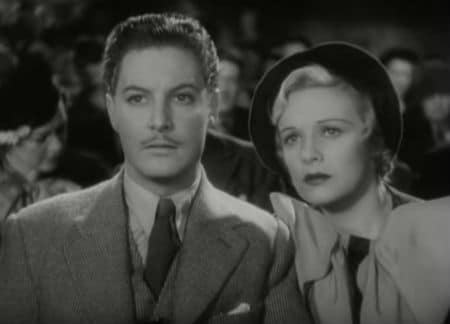
One of Hitchcock’s British films, The 39 Steps stars Robert Donat and Madeleine Carroll in the lead roles of Richard Hannay and Pamela. As in other Hitchcock films, Richard Hannay unintentionally finds himself caught up in a national intrigue. While on the run, he manages to embroil Pamela in his quest to discover who the villains are and what information they are after. Pamela is not a willing participant in this mystery which partners her with a stranger. However, circumstances force them to work together in order to stay alive.
Romantic Element
Throughout the film, Pamela is actively trying to escape Hannay and yet there is an underlying attraction between them which is never clearer than the night they spend handcuffed together in a private room at an inn. It’s a pretty sexy scene for its time and despite their lack of trust, the attraction between the two is evident.
#2 Mr. and Mrs. Smith (1941)
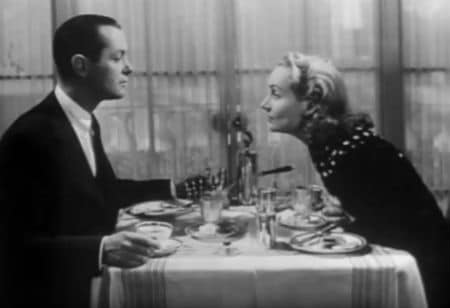
No, this is not the famous film which brought Brad and Angelina together, but Hitchcock’s one and only comedy. It stars Carole Lombard and Robert Montgomery (father to Elizabeth Montgomery who played Samantha on Bewitched). They play the title characters, David and Ann Smith. After several years of being happily married, they learn that their marriage is not legal. A misunderstanding leads Ann to believe that David does not want to be married to her. So she decides to stay single instead of remarrying him legally, but David is determined to win her back.
Romantic Element
Mr & Mrs. Smith is Hitchcock’s lightest film and could be most accurately described as a romantic comedy. Ann and David’s love is genuine, but their bantering and bickering still display a darker undercurrent which highlights the battle between the sexes.
#3 Notorious (1946)
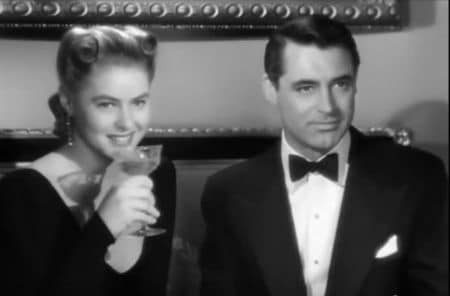
This film is Notorious (see what I did there?) for sailing through a loophole of the Hays Code. This Code enforced moral standards and dictated that no on-screen kiss could last longer than three seconds. Hitchcock skirted the issue by having Cary Grant and Ingrid Bergman’s characters engage in a long kissing sequence in which no single kiss lasted longer that what was allowed. Grant plays Devlin, a government agent who recruits Bergmann’s Alicia Huberman to act as a spy for the US government. Alicia must feign romantic interest in her father’s Nazi friend while really falling in love with her handler.
Romantic Element
There is a real love-hate relationship between Devlin and Alicia because the nature of their jobs is an assault on what they personally feel for each other. Their desire is at war with their trust in one another and their duty to the government.
RELATED POST | Classic Romantic Moment Series: The Finale of Hitchcock’s Notorious
#4 Rear Window (1954)
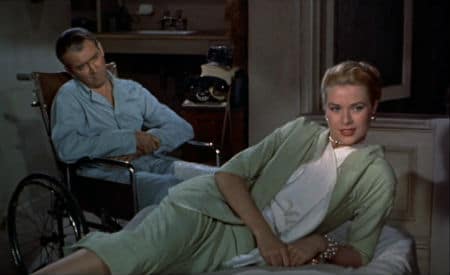
One of Hitchcock’s more popular films Rear Window features James Stewart and Grace Kelly as L.B. Jeffries and Lisa. Jeff is housebound thanks to a broken leg. He believes he may have witnessed a murder in an apartment across from his, but is unable to investigate. His girlfriend Lisa takes his suspicions seriously and decides to investigate on his behalf.
Romantic Element
Hitchcock had a fondness for Grace Kelly and her portrayal of Lisa may be one of the most loving and loyal female leads that were ever depicted in any of his films. There is a sincere rapport and trust between Jeff and Lisa, but she still remains a strong and independent Hitchcock blonde.
#5 To Catch a Thief (1955)
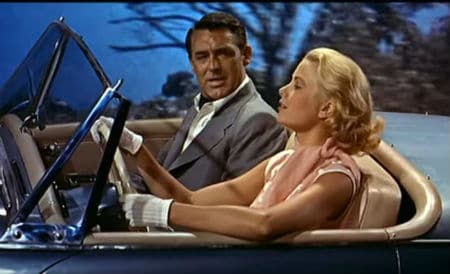
Yes, it is another Hitchcock film with Cary Grant and Grace Kelly in lead roles, but, To Catch a Thief was the first and only time all three worked together. Hitchcock has stated that “Cary Grant is the only actor I ever loved in my whole life.” Even in a Hitchcock film, you can’t cast Cary Grant without making him a romantic lead. The audience just wouldn’t have it. Grant cited Grace Kelly as his favorite actress to work with despite only making this one film together.
Grant plays reformed jewel thief John Robie. He is suspected by the police because his criminal alias is now being used by another burglar. Kelly is Frances Stevens, a gorgeous heiress vacationing in the French Riviera. She knows Robie’s identity and enjoys baiting him with it. Frances also actively pursues him even though he tries to distance himself from her. Ultimately, they decide to work together to lure the real jewel thief out and to clear Robie’s name.
Romantic Element
I think this is the most romantic of all Hitchcock films. The scenery alone screams romance. The role reversal between Grant and Kelly, where the supposedly innocent female pursues the potentially dangerous man, turns the romance trope on its head. Truthfully, when you have two of the world’s most gorgeous people in one of the world’s most gorgeous settings along with their gorgeous wardrobes, you can’t argue that the romantic storyline is definitely more of the focus than the usual suspense of a Hitchcock film.
And these five are only a few of his romantic movies. What are your favorite romantic Hitchcock films? Do you have a favorite moment? Let me know!
ARE YOU A ROMANCE FAN? FOLLOW THE SILVER PETTICOAT REVIEW:
 Our romance-themed entertainment site is on a mission to help you find the best period dramas, romance movies, TV shows, and books. Other topics include Jane Austen, Classic Hollywood, TV Couples, Fairy Tales, Romantic Living, Romanticism, and more. We’re damsels not in distress fighting for the all-new optimistic Romantic Revolution. Join us and subscribe. For more information, see our About, Old-Fashioned Romance 101, Modern Romanticism 101, and Romantic Living 101.
Our romance-themed entertainment site is on a mission to help you find the best period dramas, romance movies, TV shows, and books. Other topics include Jane Austen, Classic Hollywood, TV Couples, Fairy Tales, Romantic Living, Romanticism, and more. We’re damsels not in distress fighting for the all-new optimistic Romantic Revolution. Join us and subscribe. For more information, see our About, Old-Fashioned Romance 101, Modern Romanticism 101, and Romantic Living 101.

I love all of these, but my favorites are Suspicion and Rebecca.
Those are both great movies with more of Hitchcock’s romantic tension. One of my favorite Hitchcock films without a romantic undercurrent is Shadow of a Doubt.
Those are also really great movies which showcase Hitchcock’s use of romantic tension. One of my favorite Hitchcock films without a romantic undercurrent is Shadow of a Doubt.
I like all of the films you listed, some more favorites are Spellbound, Suspicion, and Rebecca. I think his best film looking at the dark side of love was Marnie.
I love Marnie, despite some of it’s flaws. It fascinates me every time I watch it.
I love Marnie, despite the issues that many others have with the story. It fascinates me every time I watch it.
“Mr. and Mrs. Smith” is such a wonderful film, I wish more people would see it. Whenever people think I’m talking about the Brangelina version I get a little bit depressed. Admittedly their spy games were fun to watch, but they were nowhere near as cleverly and wittily written as the dialogue between the 1941 couple. It’s a hidden gem of a movie. What surprised me is that I didn’t realise that it was a Hitchcock film to this day. It’s very different from his other films. Ha ha